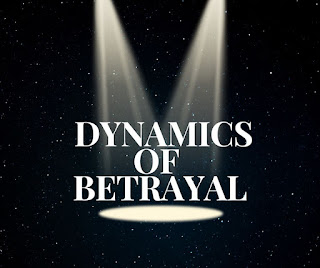The Dynamics of Betrayal
Examined in a less positive light, the absence of the dispositions for strengthening trustworthiness discussed in the previous post, are what we might call the dynamics of betrayal. Psychologists Gottman and Silver have called this the “cheaters cascade.”[ii]
Gottman
points out that research has shown the vast majority of affairs come about not
from simple lack of disciple, or a failure of moral character, resulting from
lust, but from a failure to meet our partner’s emotional needs.[iii] It is primarily a failure of
emotional attunement and trust.
The Cheaters Cascade
The
first step in the cascade might be the couple’s failure to confide in each
other, which leads to keeping secrets. Then if the couple goes through a
difficult time and one partner fails to see that their spouse is reaching out
for support, this may result in disappointment and loneliness.
Perhaps
there are some disagreements, but they are unresolved, leaving each one hurt
and feeling ignored and their emotions dismissed. This emotional lack of
attunement with the spouse, then leads to the next step.
One
of the unhappy partners reaches out and begins to unburden their heart to a new
person outside the relationship. Instead of maintaining transparency,
accountability, and alliance with their spouse, they form a new secret alliance
with another person and build a wall around this relationship. Not only are
they receiving emotional support for this person, they are protecting this new
relationship to keep it safe from their spouse.
This
is a tipping point in the relationship. This new coalition with someone other
than your partner causes you to shift your perspective and you begin to have
very negative thoughts about your spouse. Psychologists call this negative
sentiment override. The truth is we can choose to see the very same person
in a positive light giving them the benefit of the doubt or we can focus on the
negative. If this continues, you begin to trash and denigrate your spouse. All
the positive thoughts and dreams you had together become clouded.
This
leads the potential “cheater” to view their partner as untrustworthy.
More secrets create coldness and distance. Even though the “cheater” is
responsible for the distance in the relationship, they blame and label their
spouse as the one responsible. The disloyal partner blames the other partner
for their feelings of vulnerability and loneliness.
In
this state, the potential “cheater” is primed to think that they would be
better off with someone else. If the disloyal partner has reached out to
another person who is a potential romantic partner, then he or she has ignited
the fire of betrayal. They have crossed the line.
They
will likely claim that their partner has “changed,” that they have “grown
apart,” and that they are “no longer compatible.” They have allowed themselves
to slide into what psychologists call negative comparison of
their partner.
Building Commitment
In a
healthy state of commitment, spouses derogate alternatives to the existing relationship. Gottman and Silver note that the research of Caryl
Rusbult, conducted over three decades, showed that “commitment is a gradual
process in which the partners come to compare the relationship favorably to
others with increasing frequency.”[iv]
In
healthy relationships, spouses see their partner as the best alternative
against other available alternatives for relationships. In a state of positive
comparison, spouses will reject alternatives and even be willing to sacrifice
to maintain this stable relationship. In a relationship that has overall
positive comparison the spouses maintain “pro-relationship” thoughts which meet
their emotional needs, and increase dependency.
Once
they have slipped into a continuous state of negative comparison, however,
betrayal is very possible. They experience a kind of buyer’s remorse and think
to themselves, “I could do better than this.” They experience increasing
emotional disconnection, and begin to focus on “what ifs.” These toxic negative
comparisons, combined with patterns of turning away from their partner and not
acknowledging their feelings creates a negative spiral into unhappiness.
[ii] Gottman, John M., & Silver, Nan (2013). What Makes Love Last? How To Build Trust and Avoid Betrayal, Secrets from the Love Lab. New York: Simon & Schuster, 2013. p. 53



Comments
Post a Comment
Thank you for your comment on the threefoldcord blog. All comments are moderated.